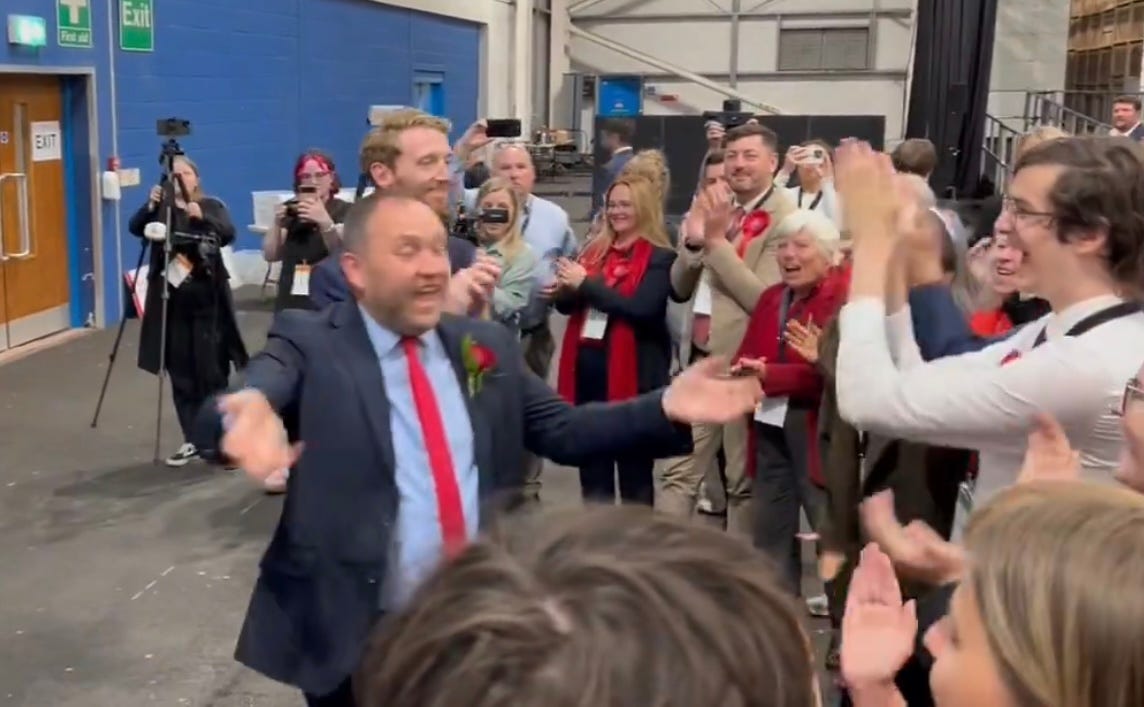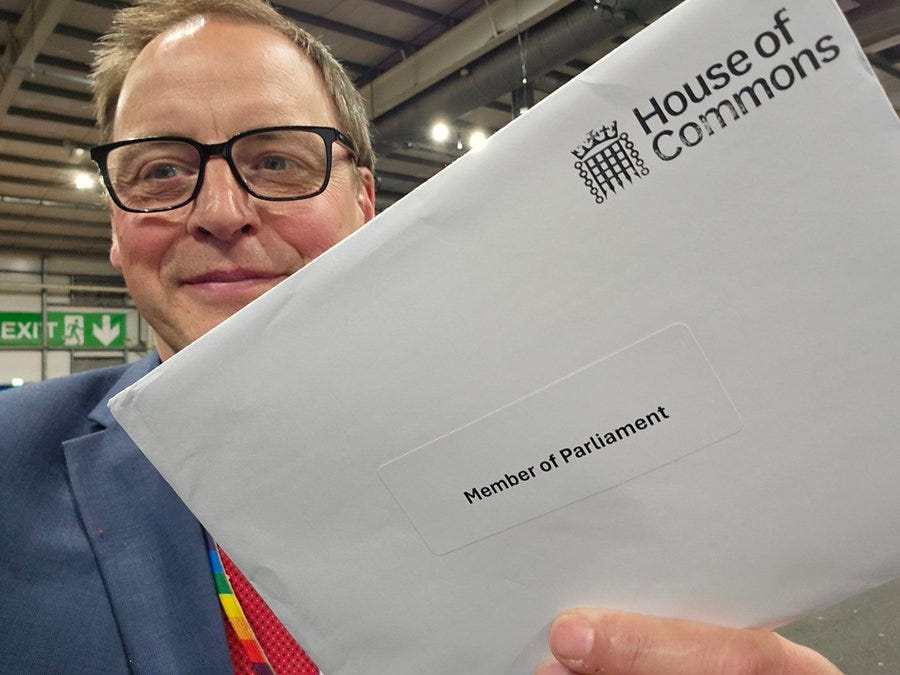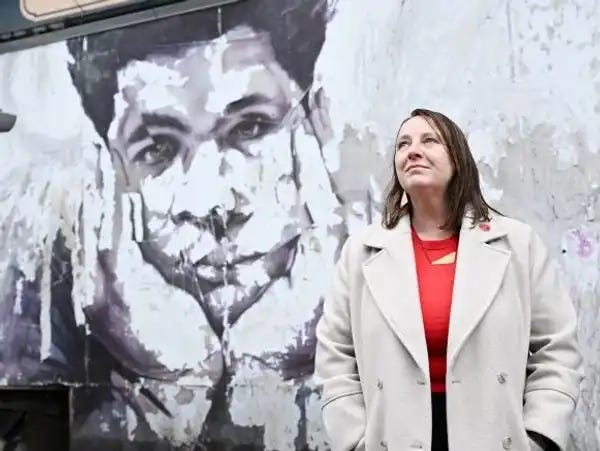Furious citizens, tactical voting and a ray of hope. Inside Labour's Edinburgh landslide
What an historic election night could mean for Scotland's Capital
Special Report by Matthew Leslie
Even a week or two before polling day it was hard to find anyone outside of the Labour Party who truly believed the party would take Edinburgh South West.
The strong personal following enjoyed by Joanna Cherry KC, a highly capable and hard-working constituency MP as well as a high-profile media performer, would see her through any drag on the SNP nationally. They would win elsewhere in the region, but overturning Cherry’s 12,000 majority was simply beyond resurgent Labour. Or so the political orthodoxy went.
When the votes were counted overnight at the Royal Highland Centre at Ingliston, the result was dramatic. A comfortable win for Labour. Their local candidate, the cycling professor of engineering and the city council’s transport convener Scott Arthur, won with a majority of more than 6,000.
The new Scottish Secretary Ian Murray was always expected to win again in Edinburgh South, but the 17,000 margin of victory resembled nothing more than the party in its pomp in its Glasgow heartland.
That in a nutshell was the story of the night as the Capital swung from SNP ubiquity to all but complete dominance by Labour.
A massive, but fragile victory
This is undoubtedly an historic result. A change of government after 14 years of rule by any one party cannot help be anything but that, but this goes further. In Edinburgh terms alone, it is almost unprecedented. Almost, but not quite, because it echoes nearly exactly the SNP’s own stunning triumph when it came from nowhere - in Westminster terms - to claim all but one seat in 2015.
“When things change in politics, they change fast,” says one tired, but elated member of the Labour campaign in the Capital, as the party’s big hitters filed up Downing Street to be appointed to the Cabinet. “What we found time and time again on the doorsteps was stone cold fury against the Tories, people are genuinely sickened by what they have seen over the last two or three years.
“Things have moved in our direction this time, but they could just as quickly flip back. We know that, we have to deliver, and deliver fast.
“We need to show people they were right to put their faith in us. Otherwise, next time, it could all come crashing down.”
Next time is likely to be the Scottish Parliament elections in 2026, when the bigger prize than domination of Edinburgh’s, and the Central Belt’s, Westminster seats is at stake. Labour now has its eyes firmly on Bute House and returning Anas Sarwar as First Minister.
Everyone knows the party now needs to deliver, locally and nationally, to build on Thursday’s result. The big question is how it can do that, when public funds are tight and the party is determined to maintain fiscal discipline.
Keir Starmer has clearly signaled his intention to headquarter Labour’s new Great British Energy company somewhere in Scotland. However, many of the areas where he is expected to announce reform - such as steps to kickstart housebuilding in England and Wales and reform the NHS - are devolved to the Scottish Parliament, leaving the Prime Minister with limited control north of Border.
Not ‘a Labour city’
If Labour’s victory across the UK is big, but potentially shallow, then its hold on political power in Edinburgh is perhaps more precarious than in many other places. There is a recognition that across the Central Belt SNP supporters ‘loaned’ their votes to Labour in order to punish the Conservatives, while traditional Tories transferred also their allegiance, seeing the party as the means to defeat the SNP. Everything is in flux, even as Keir Starmer promised to work for the “sunlight of hope”.
Besides, Edinburgh is not a natural Labour city. The party is not in its DNA in the way it is in, say, Liverpool, Manchester or (at least until recently) Glasgow. That’s not to say Labour can’t or won’t dominate for years to come, but it would be foolish to assume it as a given.
The Capital has conspicuously swung from one party to another in recent times. Once considered a Conservative city, one that produced a succession of government ministers for Margaret Thatcher and John Major in the 1980s and 1990s, in Malcolm Rifkind, Michael Ancram and Lord James Douglas-Hamilton.
Labour gradually became the dominant force, as a dynamic generation of politicians shook Edinburgh out of its moribund state in the 1980s, helping turn the city of Trainspotting into one of prosperity. Among their number, Alistair Darling and Robin Cook, stepped up into the New Labour Cabinet as Labour almost swept the board across the city-region in the 1997 election.
The SNP of course blew that all away in 2015, claiming all but one regional Westminster seat, then going on to take control of the city council for the first time. Now Labour has leadership of the council, by the skin of its teeth, as well as dominating at Westminster again.
SNP counts the cost
While Labour is preparing for government, with Ian Murray describing the party’s results in Scotland as “well beyond their wildest dreams”, the SNP is licking its wounds following a bitter defeat that was considerably worse than expected. Among the casualties were several long-serving and respected MPs, including Tommy Sheppard in Edinburgh East, its Westminster chief whip Owen Thompson in Midlothian, Livingston MP Hannah Bardell and Deidre Brock in Edinburgh North and Leith.
The defeated Joanna Cherry was characteristically blunt in her assessment in the early hours of yesterday. She declared herself “astonished” to hear Nicola Sturgeon, working as an analyst for ITV, describe the party as “they” in an apparent distancing of herself from its current fortunes.
“We saw the Conservative vote collapse in Edinburgh South West go towards Labour rather than towards me, but it hasn’t been a good night for the SNP. There are reasons people found it more difficult to vote for us,” she said.
“Our vote got squeezed on two sides. On one side those of our supporters who believe passionately in the cause of Independence felt we have not done enough in recent years to advance that. I think they are right about that and I think history will show that major opportunities were squandered by Nicola Sturgeon and Ian Blackford during the Brexit years and during the Boris years.
“On the other side, there are many people who voted SNP in the past on the reputation of the SNP for integrity and delivering competent government and that reputation has taken a bit of a battering recently.
“I think it’s very important now that the party reflect on that with humility and we address what has gone wrong.”
Meet your new MPs
What about the new faces representing us at Westminster?
Amid all the sound and fury around about her, the Liberal Democrat veteran and former journalist Christine Jardine comfortably held on to her Edinburgh West seat.
Former Transport and International Development Secretary Douglas Alexander, who served as a Cabinet Minister under both Tony Blair and Gordon Brown, returns to Westminster as the new MP for Lothian East. Speculation that he may be appointed Foreign Secretary amid doubts about David Lammy’s suitability proved to be wide of the mark, but he is still almost certain to be handed a junior ministerial role this weekend.
While most of our other new MPs could not be described as household names they are well-kent within Scottish political circles.
The woman who brought Edinburgh to a standstill
As the lead organiser of the Make Poverty History march in 2005, the new Midlothian MP Kirsty McNeill was largely responsible for bringing Edinburgh to a standstill when 250,000 protesters descended on the Capital ahead of the G7 summit at Gleneagles.
Her work then caught the eye of Gordon Brown and she was soon hired as a special advisor at Downing Street where she worked during the financial crash of 2008.
Coming from a politically active family who were heavily involved in the campaign for Independence, she has described herself as being “raised by the SNP”, citing the fight against international poverty as the reason she was drawn into Labour politics. She has most recently been working as an executive director at Save the Children.
A former president of the Oxford University Students Union, not to be confused with the Oxford Union debating society where Boris Johnson and others made their mark, she is being tipped for some kind of role in government.
She will be joined at Westminster by Scott Arthur whose election as Edinburgh South West MP will force the city council to find a new convener of its transport and environment committee.
A civil engineer by trade and an academic, he is a professor at the city’s Heriot-Watt University where he specialises in studying urban drainage.
He is familiar to followers of city politics after taking on one of the highest profile roles at the City Chambers where he regularly came under fire from the left and right for either failing to push environmental and active travel plans fast enough or too fast depending on your perspective. Among his last acts in his council role have been overseeing the introduction of the Capital’s Low Emission Zone and its shelving of a Workplace Parking Levy.
From Harvard, the Hollande campaign and Leith
Steeped in Labour politics and with a formidable intellect, the new Edinburgh East MP Chris Murray is seen as a future political star. A former political assistant to Harriet Harman, he has worked for the Foreign Office at the UK Embassy in Paris, and has masters degrees from Harvard and the London School of Economics, where he studied after attending Oxford University and his local state school in Glasgow.
He moved to Edinburgh eight years ago where he has been working most recently as a policy manager for Cosla, the umbrella organisation representing Scotland’s local authorities.
His mother Margaret Curran was MP for Glasgow East from 2010 to 2015 and Shadow Scottish Secretary under Ed Miliband.
New Livingston MP Gregor Poynton is a political strategist who worked for Blue State Digital, famous for helping deliver record-breaking fundraising results for Barack Obama’s presidential campaigns. He worked on Francois Hollande’s successful presidential campaign in France in 2012 and for the progressive Congress Party in India.
Largely London-based, his local connections run deep, having grown up in Falkirk and worked for Scottish Labour as an election organiser and for Jim Murphy when he was leader.
Unlike her new colleagues the MP for Edinburgh North and Leith Tracy Gilbert comes from a trade union background rather than building a career within party politics.
Tracy Gilbert says she was politicised by the experience of growing up in a council house in Penicuik during the miners’ strike of the 1980s. A former city council housing benefit officer, she has built a career in the trade union movement over more than 25 years, working for Union and most recently as Scottish secretary for USDAW, the union of Shop, Distributive and Allied Workers.
She is now the port neighbourhood where she has lived all her adult life.
The hard work for all of them starts now.





